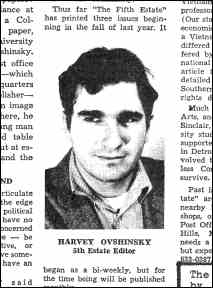Victor Taranta
5th Estate Filling Void
Reprinted from The Daily Collegian
Looking for something different in newspapers? Like to see current topics treated from a new angle? Interested in cultural events that don’t appear in the major papers? You might take a glance at “The Fifth Estate,” a Collegian-size four-page paper, and a product of a University freshman, Harvey Ovshinsky.

The austere, modest office of “The Fifth Estate”—which also serves as living quarters for the editor and publisher—might easily invoke an image to the romantic that, here he will find an angry young man bent over a cluttered table pen in hand slashing out at established institutions and the status quo.
NO AXE TO GRIND
Instead—the neat, articulate young man who sat on the edge of his bed professed no political or moral philosophy. “I have no axe to grind; I’m only concerned with insuring that those—be they liberal, conservative, or John Birchers—who have something significant to say, have an opportunity to say it
“The Fifth Estate,” said Ovshinsky, will attempt to fill the void created by the failure of the Fourth Estate (journalism)—as represented by the major papers—to give voice to every segment of society. He feels there is much—particularly in the areas of Civil Rights and U.S. Foreign Policy—that is being left unsaid.
MUST REFLECT LOCALE
Admitting to no formal training to journalism, Ovshinsky was editor of his own literary magazine at Mumford High School (Detroit) and has worked for the Los Angeles Free Press, also a liberal paper. He also admits to a limited range of reading; among his books—“The Tin Drum,” “Fanny Hill,” and several books on writing.
Understandably, Ovshinsky takes the view that because he is editor and publisher of a paper gives him no license to expound his views solely. “The paper is bigger than one person,” emphasized Ovshinsky, “it must reflect the community.”
Thus far “The Fifth Estate” has printed three issues beginning in the fall of last year. It began as a biweekly, but for the time being will be published monthly.
HAS DRAWBACKS
As for the paper itself, the most apparent drawback is its print. All the printing is done on an electric portable typewriter, and if one has ever read single-spaced type...
But the photographs are excellent, the news informative, and often startling.
The general contents of the first three issues seem to belie Ovshinsky’s intent to publish assorted views on varied topics. The main topics dealt with were Vietnam, Civil Rights and Art.
SIMILARITIES
The paper’s treatment of the first two topics can be compared somewhat with that of “The Realist” (Ovshinsky conceded a vague similarity), published by Paul Krassner in New York city.
Among the articles: A lengthy denunciation of U.S. policy in Vietnam by University history professor Dr. Norman Pollack (Our stake in Vietnam is one of economics); an interview with a Vietnam veteran whose views differed markedly with those offered by G.I.s interviewed on national TV and radio; and an article titled “Prison Notes,” a detailed description of how Southern police handle civil rights demonstrators.
Much space is devoted to the Arts, and the Art critic—John Sinclair, a local poet and University student. Sinclair is an avid supporter of legitimate theatre in Detroit. One of his efforts involved the struggle of the hapless Concept East Theatre to survive.
Past issues of “The Fifth Estate” are still available at the nearby book stores and record shops, or at the paper’s office, Post Office Box 305, Bloomfield Hills, Mich. Ovshinsky still needs a larger staff, pay is nil, but experience great. Interested? 883–0387.
Sidebar:
The Rebel by Robin Dibner
The tiger whose teeth aren’t whetted,
Has no desire to bite.
Take not his teeth but his motive from him.
